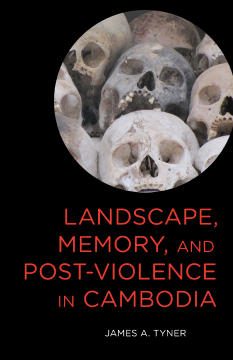
Additional Information
Book Details
Abstract
Between 1975 and 1979 the Khmer Rouge regime in Cambodia enacted a program of organized mass violence that resulted in the deaths of approximately one quarter of the country’s population. Over two million people died from torture, execution, disease and famine. From the commodification of the ‘killing fields’ of Choeung Ek to the hundreds of unmarked mass graves scattered across the country, violence continues to shape the Cambodian landscape.
Landscape, Memory, and Post-Violence in Cambodia explores the on-going memorialization of violence. As part of a broader engagement with war, violence and critical heritage studies, it explores how a legacy of organized mass violence becomes part of a cultural heritage and, in the process, how this heritage is ‘produced’. Existing literature has addressed explicitly the impact of war and armed conflict on cultural heritage through the destruction of heritage sites. This book inverts this concern by exploring what happens when sites of ‘heritage violence’ are under threat. It argues that the selective memorialization of Cambodia’s violent heritage negates the everyday lived experiences of millions of Cambodians and diminishes the efforts to bring about social justice and reconciliation. In doing so, it develops a grounded conceptual understanding of post-violence in conflict zones internationally.
Moved emotionally and intellectually by thousands of unmarked mass graves from the Cambodian genocide, James Tyner brilliantly exposes the silences in how and where the Khmer Rouge is remembered officially while arguing that this violent past holds an unreconciled place within the lives and landscapes of the present. His theorization of “post-violence” will inform and inspire human rights scholarship and activism well beyond Southeast Asia.
Derek H. Alderman, Professor and Head of the Department of Geography, University of Tennessee, USA
James A. Tyner is Professor of Geography at Kent State University, Ohio. His research operates at the intersection of political and population geography with a focus on war, violence and genocide. He is the author of 13 books, including War, Violence, and Population (2009) which received the AAG Meridian Book Award for Outstanding Scholarly Contribution to Geography and Iraq, Terror, and the Philippines’ Will to War (2007) which received the Julian Minghi Award for Outstanding Contribution to Political Geography.
James Tyner’s study of the mundane landscapes of post-violence – dams, reservoirs, wats, schools, hospitals, unmarked mass graves and burial pits – unearths the legacies of the Khmer Rouge ‘hidden in plain sight’ today. This forensic study of Cambodia's ruins, archival records and survivor’s memories offers nuanced and often unexpected insights into how collective remembrance and forgetting is experienced through the living landscapes of a violent national heritage.
Karen Till, Senior Lecturer, Maynooth University, Ireland
Table of Contents
| Section Title | Page | Action | Price |
|---|---|---|---|
| _GoBack | 199 |
